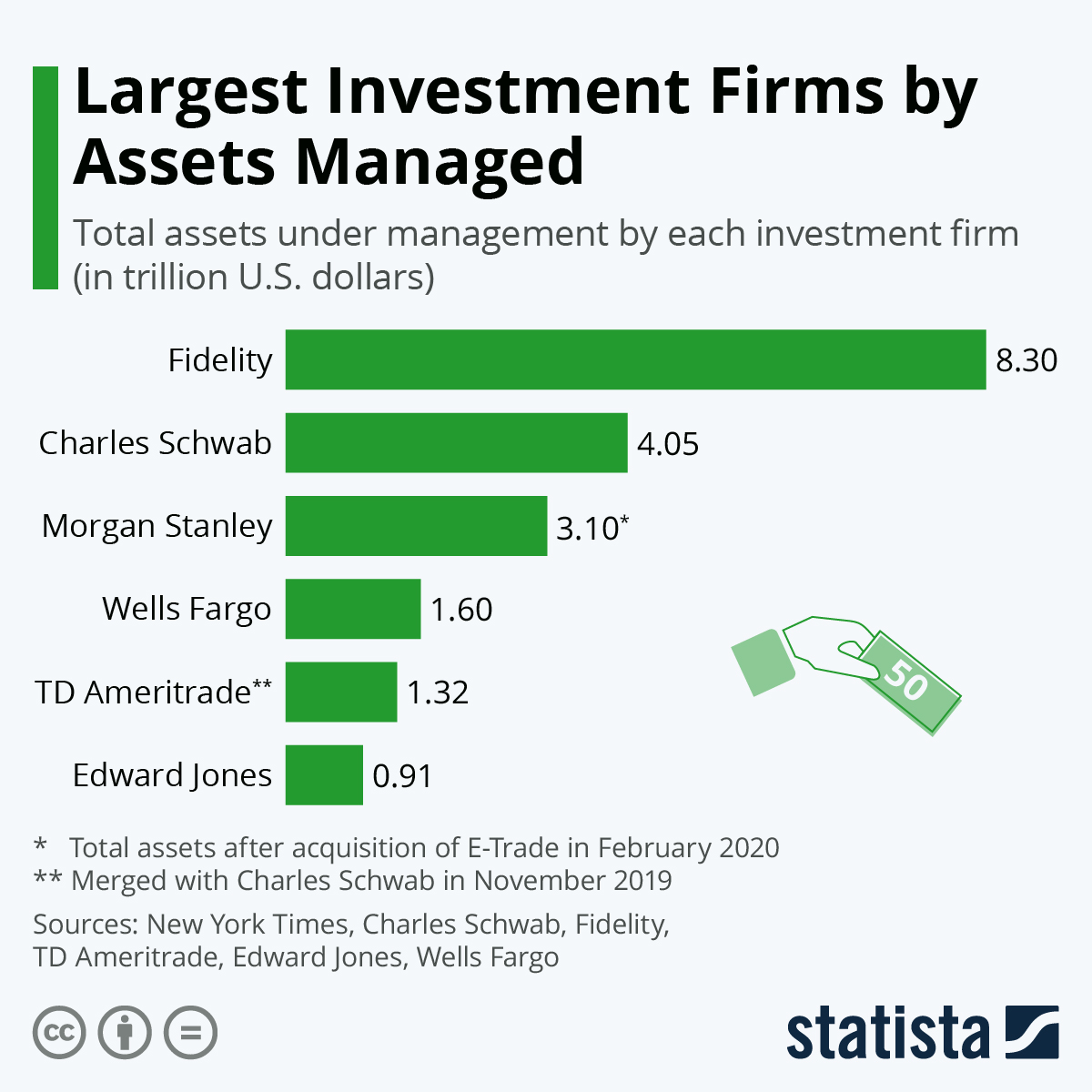World’s Top Asset Management Firms
Below is a list of the top asset management firms ranked by total AUM. BlackRock Inc, headquartered in New York City, is the world’s largest asset manager serving individual investors, companies, governments and foundations through over 80 offices worldwide. BlackRock is independent publicly traded company with a market capitalization of $116 billion as of June 20, 2024. Vanguard Group, based in Malvern, Pennsylvania, is the second largest asset management firm in the world. The company is a privately owned investment manager with 20 locations worldwide and 19,000 employees. It offers a wide range of low-cost mutual funds, ETFs, advice and other services. Vanguard is the second-largest provider of exchange-traded funds and the largest provider of mutual funds globally. Eight of the top 10 asset management firms are U.S. investment companies.
| Rank | Company | Country | Total AUM, US$b | Balance sheet |
| 1 | BlackRock | US | 10,473 | 03/31/2024 |
| 2 | Vanguard Group | US | 9,300 | 03/31/2024 |
| 3 | Fidelity Investments | US | 5,303 | 03/31/2024 |
| 4 | State Street Global Advisors | US | 4,340 | 03/31/2024 |
| 5 | Morgan Stanley | US | 3,629 | 03/31/2024 |
| 6 | JPMorgan Chase | US | 3,564 | 03/31/2024 |
| 7 | Credit Agricole | France | 2,858 | 03/31/2024 |
| 8 | Goldman Sachs | US | 2,848 | 03/31/2024 |
| 9 | UBS Group (1) | Switzerland | 2,620 | 12/31/2023 |
| 10 | Capital Group | US | 2,600 | 03/31/2024 |
| 11 | Allianz Group | Germany | 2,479 | 03/31/2024 |
| 12 | Amundi (2) | France | 2,284 | 03/31/2024 |
| 13 | Bank of New York Mellon | US | 2,015 | 03/31/2024 |
| 14 | PIMCO (3) | US | 1,890 | 03/31/2024 |
| 15 | Bank of America | US | 1,730 | 03/31/2024 |
| 16 | Deutsche Bank | Germany | 1,670 | 03/31/2024 |
| 17 | Invesco Ltd | US | 1,663 | 03/31/2024 |
| 18 | Franklin Resources (4) | US | 1,604 | 04/30/2024 |
| 19 | Legal & General (LGIM) | UK | 1,512 | 12/31/2023 |
| 20 | Northern Trust Corp | US | 1,501 | 03/31/2024 |
| 21 | Prudential Financial | US | 1,496 | 03/31/2024 |
| 22 | T. Rowe Price | US | 1,485 | 04/30/2024 |
| 23 | BNP Paribas | France | 1,385 | 03/31/2024 |
| 24 | Natixis Investment Managers (5) | France | 1,322 | 03/31/2024 |
| 25 | Geode Capital Management | US | 1,304 | 03/31/2024 |
| 26 | TIAA (6) | US | 1,280 | 12/31/2023 |
| 27 | Schwab Asset Management | US | 1,246 | 03/31/2024 |
| 28 | HSBC Holdings | UK | 1,242 | 03/31/2024 |
| 29 | Ameriprise Financial | US | 1,127 | 03/31/2024 |
| 30 | Wellington Management Company | US | 1,100 | 03/31/2024 |
| 31 | Sun Life Financial | Canada | 1,085 | 03/31/2024 |
| 32 | Blackstone Inc | US | 1,061 | 03/31/2024 |
| 33 | AXA Group | France | 1,021 | 12/31/2023 |
| 34 | Power Corporation | Canada | 1,011 | 03/31/2024 |
| 35 | Schroders plc | UK | 959.4 | 03/31/2024 |
| 36 | Brookfield Asset Management | Canada | 929.0 | 03/31/2024 |
| 37 | Sumitomo Mitsui Trust Holdings | Japan | 928.1 | 03/31/2024 |
| 38 | Manulife Financial | Canada | 923.7 | 03/31/2024 |
| 39 | Royal Bank of Canada | Canada | 903.1 | 04/30/2024 |
| 40 | Aegon Ltd | Netherlands | 891.4 | 12/31/2023 |
| 41 | Equitable Holdings Inc | US | 882.1 | 03/31/2024 |
| 42 | Insight Investment (7) | UK | 824.3 | 03/31/2024 |
| 43 | Fidelity International | UK | 816.9 | 03/31/2024 |
| 44 | Federated Hermes (8) | US | 778.7 | 03/31/2024 |
| 45 | New York Life Insurance Company | US | 771.0 | 12/31/2023 |
| 46 | AllianceBernstein (AB) | US | 758.7 | 03/31/2024 |
| 47 | Generali Group | Italy | 723.3 | 03/31/2024 |
| 48 | Dimensional Fund Advisors | US | 719.0 | 03/31/2024 |
| 49 | Principal Financial Group | US | 708.5 | 03/31/2024 |
| 50 | Affiliated Managers Group (AMG) | US | 699.4 | 03/31/2024 |
| 51 | Nippon Life Insurance Company | Japan | 680.0 | 03/31/2022 |
| 52 | Apollo Global Management | US | 671.0 | 03/31/2024 |
| 53 | Columbia Threadneedle Investments | US | 652.0 | 03/31/2024 |
| 54 | Mitsubishi UFJ Financial Group (MUFG) | Japan | 633.0 | 03/31/2024 |
| 55 | MFS Investment Management | US | 624.1 | 05/31/2024 |
| 56 | APG Group | Netherlands | 614.0 | 12/31/2023 |
| 57 | Macquarie Asset Management | Australia | 610.8 | 03/31/2024 |
| 58 | MetLife Investment Management | US | 593.7 | 03/31/2024 |
| 59 | Nomura Holdings | Japan | 587.9 | 03/31/2024 |
| 60 | Allspring Global Investments | US | 570.0 | 03/31/2024 |
1 – AUM include discretionary assets and fund assets managed by UBS.
2 – Amundi is a division of Credit Agricole Group.
3 – PIMCO, based in California, is an autonomous subsidiary of Allianz Group.
4 – Franklin Resources Inc, known as Franklin Templeton, acquired Baltimore-based Legg Mason in July 2020. In April 2022, Franklin completed acquisition of Lexington Partners L.P., a global leader in secondary private equity and co-investments.
5 – Natixis is a subsidiary of French BPCE Group.
6 – AUM across Nuveen and TIAA investment management teams.
7 – Insight Investment, headquartered in London, is a wholly-owned subsidiary of The Bank of New York Mellon Corporation (BNY Mellon).
8 – Federated Hermes Inc was formerly known as Federated Investors Inc (FII).
What Is the Average Investment Management Fee?
SmartAsset maintains strict editorial integrity. It doesn’t provide legal, tax, accounting or financial advice and isn’t a financial planner, broker, lawyer or tax adviser. Consult with your own advisers for guidance. Opinions, analyses, reviews or recommendations expressed in this post are only the author’s and for informational purposes. This post may contain links from advertisers, and we may receive compensation for marketing their products or services or if users purchase products or services. | Marketing Disclosure

Average investment management fees are around 1%, which means thata $1 million account would have to pay investment management fees of approximately $11,700 annually for services rendered.Fees would likely be paid quarterly. However, there are many factors to consider regarding investment-related costs.
Consider asking a financial advisor about what fees you can expect while partnering with them for investment management.
What Do Investment Management Fees Pay For?
Investment management involves the professional assessment and management of assets. Assets can fall under various types, or classes, including the following:
- Stocks
- Bonds
- Mutual funds
- ETFs
- Alternative investments, such as real estate and commodities
Financial advisors and their teams are responsible for researching markets and trends in order to create investment strategies in order to bring your money to its full potential. Some investment philosophies and strategies that are commonly used include fundamental analysis, technical analysis, charting analysis and cyclical analysis.
Firms also consider other factors, such as your risk tolerance, time horizon, liquidity and income needs, as well as any specific financial or investment goals you may have when putting together these strategies.
Types of Fees and Fee Schedules
Many times, advisors have an opportunity to earn commissions from insurance sales. If this applies to a firm, it would make the firm fee-based, as it receives income from both client fees and outside sources. This is different from a fee-only firm, which avoids this kind of conflict of interest by only earning compensation from the fees that clients pay.
Wrap fee programs are another kind of fee structure that firms employ. These also bundle together more than the usual services in one package. Wrap fees include trading fees, commission fees, administrative costs and other investment expenses in one charge.
Additionally, fees can also be fixed, as opposed to being based on AUM. Sometimes, certain services are provided for a flat fee or at an hourly rate. Very often, the services rendered for these fees do not encompass the average investment management services but rather, one-off services, such as shorter-term financial planning or consultation.
To find out more specific information, one resource available to potential investors and customers of an advisor firm is the firm’s Form ADV, which a firm files with the Securities and Exchange Commission (SEC) under specific requirements. You should look at the Form ADV carefully – there’s a lot of fine print – to understand the types of fees and fee schedules.
Speaking with a financial advisor can provide you with expert to walk you through all those little details.
Other Fees to Watch Out For

Whether investing with an advisor firm or on your own, it’s important to understand everything that your fees cover and any other fees that may apply. These fees may include certain transaction costs and brokerage fees. Certain commissions may apply, as well as performance-based fees.
Research each firm thoroughly, including its schedule of fees, to better understand which of these expenses may apply to you.
Robo-Advisor Fees
For those who are relatively new to or have smaller account balances to start with, it might be useful to consider working with a robo-advisor.
Generally, robo-advisors charge lower fees than traditional advisors, with an average 0.25% robo-advisor fee in 2024. Be sure to screen services carefully, looking for the best robo-advisors that offer superior service, planning tools and resources.
How to Evaluate If the Fee Is Worth It
Many investors wonder if paying a financial advisor’s fee — often around 1% of assets under management — is really worth it.
While every client’s situation is unique, research and experience suggest that good financial advice can add significant value over time. Vanguard has estimated that working with an advisor can add about 3% more to your portfolio annually compared to going it alone. Over a lifetime, that can add up to 30–200% more net worth, depending on your starting age and assets.
A skilled advisor doesn’t just pick investments — they also help you avoid costly mistakes, optimize your tax strategy and stay on track emotionally when markets get rough.
The value comes from two main areas: growing your investments and minimizing taxes.
- On the investment side, advisors can help you align your portfolio with your goals and risk tolerance, recommend better investment vehicles and adjust strategies when markets or your circumstances change.
- On the tax side, they may suggest strategies like tax-loss harvesting, charitable giving plans or tax-efficient account withdrawals to keep more of your money working for you.
Perhaps just as important, an advisor helps you navigate the emotional side of investing. By preventing panic selling during market downturns or chasing fads during stock market bubbles, they can help protect you from decisions that hurt your long-term results.
In short, a good advisor is more than a stock picker — they’re a partner who strategizes with you to grow and protect your wealth, often earning their fee many times over.
Use our free calculator to determine how much a financial advisor is worth to you.
Bottom Line

Average investment management fees are over 1% for $1 million in assets under management. It is important to know what kinds of fees firms may charge and how they structure them. If you are not ready to work with an advisory firm that will charge more, you might want to look into the possibility of using a robo-advisor. However, they may not be able to handle more complex financial situations with the expertise that a professional traditional advisor might.
Find a financial advisor in your area who can help you reach your financial goals.
Tips for Investors
- If you’re primarily investing to build a secure retirement, then consider first checking out our retirement calculator. Just punch in your current savings, your target retirement age and a few other details, and the calculator will indicate whether you’re on pace to meet your retirement income needs.
- Finding a qualified financial advisor doesn’t have to be hard. SmartAsset’s free tool matches you with up to three financial advisors in your area, and you can interview your advisor matches at no cost to decide which one is right for you. If you’re ready to find an advisor who can help you achieve your financial goals, get started now.
Photo credit: ©iStock.com/sutlafk, ©iStock.com/Teamjackson, ©iStock.com/ljubaphoto
Nadia Ahmad, CEPF®Nadia Ahmad is a Certified Educator in Personal Finance (CEPF®) and a member of the Society for Advancing Business Editing and Writing (SABEW). Her interest in taxes and grammar makes writing about personal finance a perfect fit! Nadia has spent ten years working as a seasonal income tax assistant, researching federal, state and local tax code and assisting in preparing tax returns. Nadia has a degree in English and American Literature from New York University and has served as an instructor/facilitator for a variety of writing workshops in the NYC area.
Read More About Investing

How to Invest
What Are Inverse/Short Gold ETFs?
April 21, 2025 Read More

Real Estate
Is It a Real Estate Buyer’s or Seller’s Market? Key Indicato.
June 27, 2025 Read More

Portfolio Management
Cash vs. Investments: What Percentage Should You Keep?
June 5, 2025 Read More

Portfolio Management
What It Takes to Manage a Cross-Border Investment Portfolio
July 10, 2025 Read More
More from SmartAsset
- Compare Financial Advisor Matches Today
- How to Find and Choose a Financial Advisor
- The Top Financial Advisors in the U.S.
- How Much Do I Need to Save for Retirement?
- Mortgage Calculator
- Compare Mortgage Rates
Get in touch
SmartAsset
Get Social
Legal Stuff
SmartAsset Advisors, LLC (“SmartAsset”), a wholly owned subsidiary of Financial Insight Technology, is registered with the U.S. Securities and Exchange Commission as an investment adviser. SmartAsset’s services are limited to referring users to third party advisers registered or chartered as fiduciaries (“Adviser(s)”) with a regulatory body in the United States that have elected to participate in our matching platform based on information gathered from users through our online questionnaire. SmartAsset receives compensation from Advisers for our services. SmartAsset does not review the ongoing performance of any Adviser, participate in the management of any user’s account by an Adviser or provide advice regarding specific investments.
We do not manage client funds or hold custody of assets, we help users connect with relevant financial advisors.
This is not an offer to buy or sell any security or interest. All investing involves risk, including loss of principal. Working with an adviser may come with potential downsides, such as payment of fees (which will reduce returns). Past performance is not a guarantee of future results. There are no guarantees that working with an adviser will yield positive returns. The existence of a fiduciary duty does not prevent the rise of potential conflicts of interest.
https://www.advratings.com/top-asset-management-firmshttps://smartasset.com/investing/what-is-the-average-investment-management-fee

